In over 20 countries worldwide, people who use drugs can get them analysed to identify their contents. Results from these drug checking services are delivered alongside tailored harm-reduction advice. Use of drug checking services has been found to be associated with safer practices among people who use drugs, and has led to the identification of previously unknown and/or dangerous circulating illicit drugs.
At present, routine chemical analysis of circulating illicit drugs in New South Wales is undertaken on seized drugs and biological samples by NSW Health Pathology Forensic and Analytical Science Service (FASS) and on wastewater. There are no drug checking services currently operating in NSW, and this pilot project (limited to people who inject drugs in Sydney) will provide valuable insight into feasibility and operational challenges in this setting.
We aim to:
- Assess the feasibility, acceptability, benefits and limitations of a drug checking service at Sydney’s Medically Supervised Injecting Centre (MSIC);
- Assess the impact of providing MSIC service users with rapid and accurate information about substances they may consume, along with tailored harm-reduction advice about those substances;
- Compare what substances are sold as with what they actually contain based on chemical analysis;
- Identify highly dangerous substances, facilitating improved and targeted health promotion activities and circulation of alerts, including via existing Early Warning Systems; and
- Compare the results of on-site rapid testing techniques with off-site ‘gold standard’ analysis.
We will achieve these aims through the co-design and implementation of a pilot substance analysis service at MSIC, with n=100 MSIC clients. We will conduct a survey with participants on acceptability, responses to the analysis results, and preferred means of communicating drug alerts. This project will promptly identify circulating drugs, improving the ability to deliver drug alerts and informing communication with consumers through NCCRED’s Prompt Response Network. It also builds on existing NCCRED-funded projects aimed at monitoring fentanyl and its analogues in Sydney’s drug markets. This project will support partnerships between an NGO service provider (The Loop Australia) with Uniting MSIC, consumers, the University of New South Wales and NSW Health Pathology Forensic and Analytical Science Service. The pilot project will provide innovative proof-of-concept which we will use to apply for funding for further opportunities.
Dr Robert Page, Principle Investigator
The Loop Australia, and NDARC, UNSW
Dr Marianne Jauncey, Co-investigator
Medical Director, Uniting MSIC
Prof Alison Ritter, Co-investigator
UNSW Sydney
Dr Monica Barratt, Co-investigator
RMIT University
Dr Richard Kevin, Co-investigator
The Loop Australia
A/Prof Suzanne Nielsen, Co-investigator
Monash University
Ms Sharon Neville, Co-investigator
Forensic and Analytical Science Services (FASS)
Ms Una Cullinan, Co-investigator
Forensic and Analytical Science Services (FASS)
Mr Jacob Fry, Co-investigator
The Loop Australia
Mr Matt Dibbayawan, Co-investigator
The Loop Australia
Prof Ian McGregor, Co-investigator
University of Sydney, Lambert Initiative
Mr Cameron Francis, Co-investigator
The Loop Australia
Dr Cheneal Puljevic, Co-investigator
The Loop Australia
Ms Sarah Hiley, Co-investigator
The Loop Australia
Prof Fiona Measham,Co-investigator
University of Liverpool




